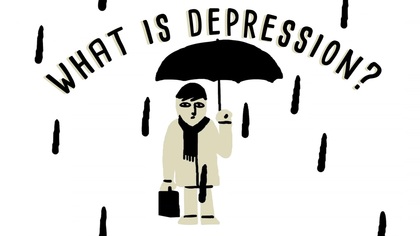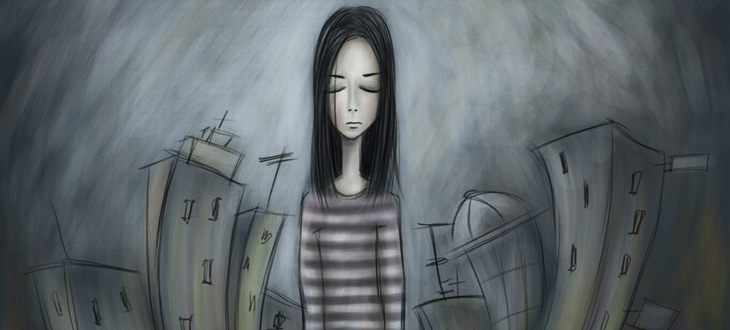What is depression?
“That's the thing about depression: A human being can survive almost anything, as long as she sees the end in sight. But depression is so insidious, and it compounds daily, that it's impossible to ever see the end. The fog is like a cage without a key." - Elizabeth Wurtzel
What is Depression?

Most of us feel crappy and miserable from time to time, sometimes we might even say that we're depressed to describe a tough week at work, or how bad we're feeling after a relationship break-up. Feeling down or hopeless when life is difficult is fairly normal, often once we've made it through the difficult situation we start feeling more like ourselves again. It's when we don't return to feeling okay and the feelings of unhappiness persist - even after the difficult situation is over - that its possible that you have what's called clinical depression. Depression doesn't always looks the same, it can bring with it a wide variety of feelings, how strongly these feelings are felt, and in the effect that it has on one's life.
It's important for people with depression (and their support people) to know that people suffering from depression may at times feel happy, and may not appear consistently depressed to others. This is important as they may still need ongoing support for their depression even if they're having a good few days. In other words, loss of support should not be a consequence of feeling or acting better for a while.
Depression is common in New Zealand, with a prevalence of one in six New Zealanders experiencing depression at some point in their lives. If you think you are depressed its important that you don't try to manage it on your own and that you talk to someone about how you're feeling. This could be your GP, a family member, friend, or a counsellor.
It's important for people with depression (and their support people) to know that people suffering from depression may at times feel happy, and may not appear consistently depressed to others. This is important as they may still need ongoing support for their depression even if they're having a good few days. In other words, loss of support should not be a consequence of feeling or acting better for a while.
Depression is common in New Zealand, with a prevalence of one in six New Zealanders experiencing depression at some point in their lives. If you think you are depressed its important that you don't try to manage it on your own and that you talk to someone about how you're feeling. This could be your GP, a family member, friend, or a counsellor.
What are the signs of depression?There are specific symptoms and signs to help you to determine if it's clinical depression:
Key Signs of Depression
Possible Signs of Depression
|
Psychotherapy and counselling for depressionIf you recognise in yourself signs of clinical depression then its time to seek professional help - the sooner you start treating your depression, the easier it is to recover (and the sooner you'll start feeling better again). The step of actually seeking treatment is a positive step as it goes against the urge that many sufferers of depression have - to isolate from others and deny any sense of hope. While seeing your GP for antidepressants may be worthwhile particularly if your depression is severe, research shows that talk therapy (psychotherapy or counselling) offers the most long lasting benefits and effectiveness for depression. Psychotherapy or counselling will help you to gain insight, skills, and can help to develop your emotional capacities so you can feel pleasure, connection, and resilience once again.
Therapy for depression will help you to reconnect with feelings that have become inaccessible in the depressed numbness, re-establish important relationships or grieving loss of relationships, and find new ways to move forward so you can live an engaged and meaningful life. The style of counselling that we offer helps to get to the cause of the depression so that you can feel better - and keep feeling better. For more in depth information about our approach to treating depression, and treatment choices, click here. |
Specialty Areas |
Online BookingBook my first session.
If there are no bookable services showing via the online booking website, this means we currently have a waiting list for new clients. Please give us a call or email if you would like to add your name to it. |
Lucid Psychotherapy and Counselling, Christchurch provides affordable and effective individual psychotherapy, counselling, Intensive Short Term Dynamic Psychotherapy (ISTDP), ecotherapy, treatment for depression, stress, panic and anxiety disorders, and mindfulness mentoring, servicing the area of Ōtautahi Christchurch, Hokitika, Māwhera Greymouth, West Coast, Aotearoa New Zealand. We also offer online therapy sessions using video i.e., Zoom (telehealth). © 2015-2024 Lucid Psychotherapy & Counselling.
